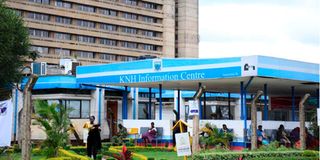How cancer drugs are stolen at KNH, resold expensively

Kenyatta National Hospital in Nairobi.
An investigation by Saturday Nation has revealed how syndicates that steal cancer drugs and other expensive medications for sale operate at Kenyatta National Hospital.
The findings revealed that the internal drug theft not only involves medics but a web of employees, including security guards and cleaners.
“It is not happening on common drugs but on high-end drugs that can fetch them more money, including cancer, hypertension and prescription-only drugs,” said a doctor, who sought anonymity as he is not allowed to speak to the media.
They are also trading in controlled drugs, which fetch a lot of money.
He said the stealing of drugs does not take place at the pharmacy or in the stores where the drugs are kept but in hospital wards. It is rampant in the private wing, though happens in other wards too.
“What they do, when a prescription of the drugs is done, they go with the prescription to get the drugs, but the drugs do not reach the patients. They are given to some cleaners who coordinate with security guys to pass the medicine,” says the medic.
The drug is later sold to the same patients expensively or taken to the pharmacies with a ready market.
“They lie to patients that the drug is not available. When patients ask where to buy it, they send them to a pharmacy where the one that was stolen was taken.”
What this means is that patients are not getting drugs prescribed, thus exposing themselves to life-threatening risks and at times drug resistance as they are not adhering to the prescribed dosage.
Although the issue went public early this week after six employees at KNH were charged with conspiring to steal cancer drugs worth Sh4.6 million, the medic said they have been dealing with the same problems for long.
“We have had cases of patient’s records indicating that they have been given drugs, however, when they are asked, or on seeing the records, they deny getting the drug,” he said
The medic said the diversion of drugs is worse in intensive care units where patients are unconscious and may not know whether or not they are given drugs.
“You might be buying very expensive drugs thinking that your patient is being given the medicine, only to find out later that they were not given the drugs and they have been diverted to other pharmacies,” he told Saturday Nation.
This is happening after the Nation highlighted a shortage of more than 20 different cancer drugs that ran out at the hospital, with patients having to dig deeper into their pockets to seek alternative services at the expensive private facilities.
Some of the crucial drugs that are still out of stock and were part of the drugs that were stolen include radioactive iodine 131 (I-131), Vincristine, Doxorubicin, Mercaptopurine, Allopurinol, Cytoplastin and Cyclophosphamide. Chemotherapy drugs out of supply are Cisplatin, Adriamycin, or its generic variety Rubex.
However, other drug shortages were due to supply challenges. For instance, radioactive iodine for the treatment of thyroid cancer has been out of stock for more than five years at the facility.
“We are going to crack the whip, but let’s wait for court proceedings to end. We cannot compromise the health of our patients, yet you are charged with ensuring they get better. What’s the worst such a person can do?” said Dr Evanson Kamuri, the chief executive officer of the national referral facility.





